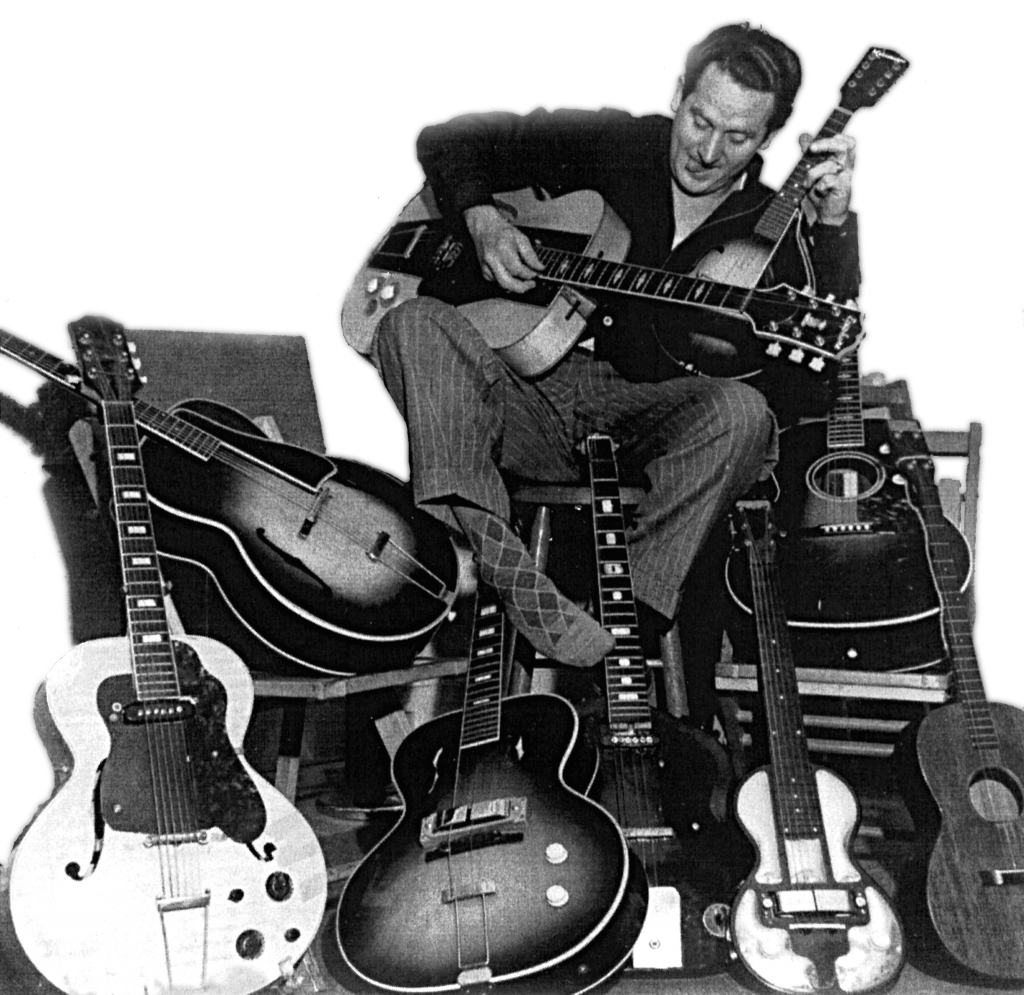From a very early age, it was obvious that young Lester William Polsfuss had a knack for music. But by his mid teens, it became clear that it was more than just a knack; he was virtually a prodigy. Starting around eight years old, young Lester toyed with anything he could get a melodic sound out of, but, after picking up a guitar, his obsession and passion for sound quickly blossomed into a fruitful career that would go down in music history.
Before he was even a teenager, he was making money in tips performing around his hometown of Waukesha, Wisconsin. By 1934, Lester, then in his early teens, had dropped out of high school and was performing in and around Chicago. He had encountered many obstacles of the music electronics of the day.[1. Salem Press Biographical EncyclopediaResearch Starters, 2017, s.v. “Les Paul,” by John R. Holmes.] Guitars were simple and all somewhat similar, and recording music with a full band was a troublesome and repetitive ordeal. He did not intend to be limited by either of these issues. Rather than fall into the repetition of the music industry of his day, he began to set himself apart by experimentation.
Lester’s instrument ideas were at first shot down by large corporations. In 1941, he even brought one of his first solid-body guitar prototypes to Gibson, but the company quickly dismissed him.1 This rejection seemed to motivate him even more, and he returned to the drawing board while his performing career began to culminate.
He despised the fact that his early music sounded so similar to other artists of the day. Because of this, in 1947, Polsfuss started his own recording studio, in which he began utilizing over-dubbing and multitrack recording, which allows one musician to record one instrument at a time and overlay them so that it seems that they are being played at the same time.2 Although it was at first a venture for his own personal music, many musicians flocked to his home studio wanting to be recorded by Lester.
Just as these endeavors were taking off, in 1948, Lester suffered an almost career ending injury, in which his elbow was crushed beyond the point of reconstruction. He made the choice to have his right arm permanently set at less than a 90 degree angle, leaving him the ability to cradle a guitar.3 This action alone is a prime example of the dedication that Polsfuss possessed. Instead of letting his accident end his playing, or let his early failures deter him, he continued to strive to improve and increase the options for creativity that musicians had. He tried again to invent a solid body guitar and new sound recording techniques, all while continuing to work on his own music.
His talent on the guitar gained him so much attention that Gibson, while still unwilling to accept his prototype guitar model, decided to hire him as somewhat of a consultant.4 They wanted his name associated with their product, and they wanted his unmatched innovative mindset. The company created their own solid-body guitar model with the help of Lester, and the name came naturally.5 The Les Paul guitar was created, while Lester came to reach the pinnacle of his fame.

Unwillingness to settle was what set Lester apart from other musicians of the day—his constant need to experiment and create something better or at least different. Rather than just becoming the best he could be at the instruments of the day, he almost seemed more interested in creating new and improved devices to improve his playing. Without this determination, he might have just been another musician in history.
Les Paul, suffering from injury, old age, and arthritis, still continued to play guitar and work with music until his death in August of 2009.3 His lifetime achievements consist of his induction into the Rock and Roll Hall of Fame in 1988, a National Medal of Arts in 2007, multiple Grammys and Emmys, and countless other honors. While his guitar playing styles were an influence to guitarists everywhere, his greatest influences on the music industry were his help in creating a solid body guitar and his creation of over-dubbing and multi-track recording, which have been used by almost every musician since. His name has been immortalized in music history because of his contributions, and any fan or member of the music community has reason to thank him.
- Paul Verna, “‘Just A Pure Genius’: celebrating the legacy of Les Paul, the tinkerer who (really) helped invent rock’n’roll,” Billboard, (2015): 67. ↵
- “The Man Before The Guitar: Remembering Les Paul At 100,” All Things Considered, (June 9, 2015). ↵
- Salem Press Biographical EncyclopediaResearch Starters, 2017, s.v. “Les Paul,” by John R. Holmes. ↵
- “Les Paul and the Electric Guitar,” Innovation Masters: History’s Best Examples of Business Transformation, (2012): 196-199. ↵
- Calen D. Stone, “Paul, Les,” Contemporary Musicians, Vol. 2, (1990): 186-188. ↵
- Salem Press Biographical EncyclopediaResearch Starters, 2017, s.v. “Les Paul,” by John R. Holmes. ↵



52 comments
Cameron Lopez
I like reading about positive stories like this one explaining people who overcame the worst and followed their passion and made it to the top. I remember Les Paul from when I was younger and hearing records of him from my grandfather, he was amazing at Guitar and the way he made music flow. I’m glad music was had such leaders that changed the way music transformed. It makes me wonder on if people like Biggie Smalls and Elvis, even Queen didn’t have their lives taken at such a young age how they would of changed music even more.
Crystal Baeza
I always enjoy reading articles about those who overcame their obstacles and had a successful ending. Les Paul will always be remembered for his beautiful work on guitars and creativity. It’s always interesting reading about how a person became so passionate about their artwork and what kept them going. I wonder how music would have been differently if it wasn’t for him continuing his need to perfect instruments.
Honoka Sasahara
I have never heard about the pioneer of Les Paul guitar’s story. I was so surprised to know that he continued creating and improving his guitar, and such a great person were living until 2009, no more than 9 years ago. I think that he was definitely one of the greatest inventors in the history who had a big influence on the world of music.
Luis Magana
Ive been playing guitar ever since I was in eight grade, but I’ve never really been very good at it my strong suit has always been physical sports. Music still attracts my attention even though I might not be talented in that area. I really noticed how Lester despite his injury decided to pursue his passion for music and not give up. Even though I have never really heard of him I can imagine how big of an inspiration he is to other artists.
Engelbert Madrid
The Gibson Les Paul is one of the most selling electric guitars in the music market. The Les Paul suits very well in several genres. Guitar legends like Jimmy Page, Slash, and Zakk Wylde use the Gibson Les Paul model in their performances. It is interesting how jazz guitarist Les Paul became so successful in his music career. His talent even led him having a contract with Gibson on making his own signature guitar in the music industry. I enjoyed reading the article, but I would have liked to know some of his music works.
Micaela Cruz
Although I am not entirely aware of everything music, I have sure heard of Les Paul and his famous guitars. His background story is interesting, learning how his passion for music started at such a young age. It was interesting to learn how he had gone to Gibson to promote his guitar and although he might have initially mad at the rejection he received, if it wasn’t for his rejection, he might not have ever been as famous as he was and still is today. Les Paul’s desire to always create something better is admirable because he always had a driving force behind his success.
Daniela Duran
I think it is amazing how his will to be different, motivated Lester to create something so amazing. All he wanted was to please his limitless interests and he ended up benefiting the entire world. He is the living proof and definition of passion, because, as the author mentioned, he didn’t just want to be good, he wanted to be different. I was really impressed by his resilience and the way he went around every obstacle that crossed his way. In many occasions, such as when he was rejected, other people would have given up, thinking their ideas were lame because they were not accepted by others. I especially admire how he decided to have his arm permanently settled to an angle smaller than 90° just to be able to continue playing. This not only makes him admirable…it makes him a hero.
Roman Olivera
The name Les Paul is known by music lovers and guitars players throughout the world. Without Lester’s help in creating a solid body guitar and his creation of over-dubbing and multi-track recording, where would the rock and roll style and music period be, namely because these two things have been used by almost every musician since there inception. I’m glad someone did a small article on the contributions that Les Paul had to the music industry. Great work.
Mia Stahl
It is always great to see someone who faced so many obstacles in pursuit of their passion able to overcome them and find success. I loved this article because it showcases a true pioneer of sound. It is so rare that an artist is willing to dive into completely new sounds, as it shows true creativity and lack of fear of failure. I could not imagine what music would sound like had Lester stopped following his dreams.
Alexis Martinez
I think it is so inspirational that despite the setbacks he continued to make music and be such an influential person. Before reading this article I had never heard of him but I think he is such an inspiration to artists today because he fought for his music. He hated the way music was back then so he changed it and I think that’s amazing. Today music all sounds the same and I think if more artists though like him, the music industry would be a different place.